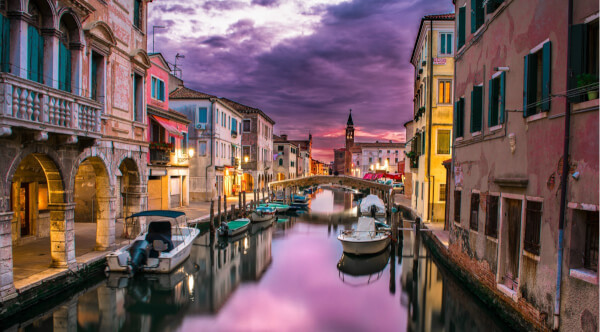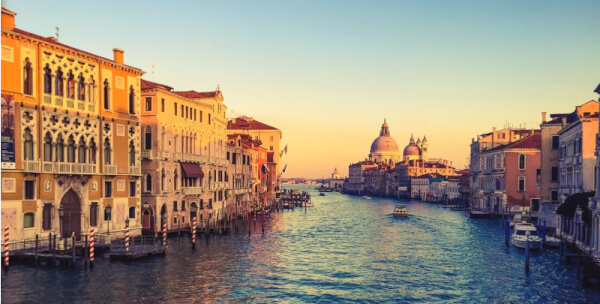Want Italian dual citizenship or nationality? Read this guide.
Here’s the lowdown on who can apply and how you go about getting dual citizenship with Italy.

Dreaming of summers spent in Tuscany or lounging by turquoise Mediterranean waters? Perhaps eating authentic Italian pizza and pasta every day is the dream or the chance to explore ancient cities is calling your name? Whatever the reasons, a move to Italy from Australia has so much to offer.
With a wealth of beautiful cities to settle in, a low cost of living and warm, welcoming locals, it's little wonder Italy is a favourite for many expats.
Whether you’re looking for a lifestyle change, retiring or spending a gap year abroad, this guide covers all the essentials. From visa types to healthcare, finding work, safety and more we’ve got the information you need to know about moving to Italy from Australia.
| 💸 Keep 40+ currencies and get personalised account details for currencies like AUD, EUR, USD, GBP & CAD – Send and receive payments from abroad like a local |
|---|
Learn more about the
Wise Account
Before we dive into the details of moving from Australia to Italy, let’s start with a look at some of the basics.
| Capital | Rome |
|---|---|
| Official languages | Italian |
| Population | 60 million |
| Currency | Euro (EUR) |
| Biggest cities (by population)¹ | Rome, Milan, Naples, Turin, Palermo, Genoa |
| Weather | Mediterranean climate with hot dry summers and generally mild winters. Most rainfall occurs during spring and Autumn. Northern, more mountainous regions can experience heavy snowfall during winter. |
| Government type | Unitary parliamentary republic |
| Average yearly salary (2022-2023)¹ | Approx. EUR€32,000 |
As seen on 08 October 2024
Not just offering great coffee, delicious food and a delightful climate, Italy outperforms several other countries in terms of work-life balance, health and wellbeing and community connection.²
Culturally rich and renowned for its beautiful architecture and art, Italy is also known to be a friendly and welcoming country. With most jobs and housing centred around major cities, Italy is great for those who enjoy both country and urban living.
Small eateries, cafes and mini-markets (grocery stores) are plentiful in most locations, making it easy to get the day-to-day essentials. However, as many Italian cities are historic and feature small winding laneways, larger shopping malls and retail outlets tend to be out of town in more rural areas.
A great launch point from which to explore the rest of Europe, it should also be noted that Italy has a higher unemployment rate and lower education standards than many other nations according to OECD better life index.²
Below is a brief rundown of the pros and cons of moving to and living in Italy.
| Pros | Cons |
|---|---|
|
|
Before moving to Italy to live, it is worth noting that specific criteria must be met. These include³:
Italy offers multiple visa types with differing requirements for permanent and long-term stays.
Firstly, it should be noted that work visas cannot be applied for directly and are the responsibility of an Italian employer to arrange on your behalf. This means you must be already hired or have signed a contract to be eligible for this visa category.
Alternatively, the main three visas which you can apply directly for are:
For those hoping to move to Italy for up to one year, this visa is available to those between the ages of 18 to 35 years old. Despite its name, you do not have to work and can travel for the duration of the visa if desired.
Alternatively, you can work up to 6 months with a limit of up to three months per employer.⁴ This visa cannot be extended beyond one year.
This visa is for those who wish to settle permanently in Italy and that will not undertake any form of employment during their stay. As working is not permitted, you must be able to provide evidence of substantial financial means. A lease contract for a minimum of one year or a title deed for real estate must also be provided.⁴
Allowing you to stay up to a year in Italy, extensions are permitted so long as the requirements can still be met.
This visa allows professionals who work online for foreign companies or are self-employed to stay in Italy while conducting their business remotely.
Key requirements include proof of sufficient income, health insurance and relevant education and experience as a remote worker. The visa offers the opportunity to live in Italy for up to one year, with the possibility of renewal.⁵
No matter which visa type you pursue, an Italian residence permit (permesso di soggiorno) will also be required and must be obtained on arrival to Italy. This must be done within 8 days of arrival at a local police station (Questura).⁴
Additional documentation is usually required to secure this, which may include proof of health insurance.
Yes, Italy is considered a safe place to visit and live in for Australians. It is ranked almost on par with Australia on the global crime and safety index.⁶
However, while serious crimes are uncommon, petty crimes such as pickpocketing and bag snatching, especially in public places, are common. So it is advisable to be alert when in tourist areas or on public transport.⁷
Earthquakes and volcanic activity are also not uncommon in Italy and forest fires can frequently occur during the summer months.⁶ It is recommended to monitor the media regarding these events and follow the advice of local authorities as needed.
Recent estimates show that only around 13% of Italians can speak English, with more than 97% of residents speaking Italian only as their mother tongue.⁸
While English is increasingly being taught in schools, learning at least some basic Italian will be necessary to communicate. This will be especially true if you are in rural areas or speaking with older generations.
Thankfully, learning Italian is a language that you can pursue quite easily, either before you depart or on arrival. Whether you prefer in-person tutoring or online options, accessing Italian lessons is usually very simple to do. Practising with locals is also encouraged and is a great way to get to know your community.
Italy has a great public healthcare system that is similar to Australia’s with comprehensive medical care accessible at hospitals, public clinics and local health centres.
While health insurance is recommended and may also be necessary to obtain your residency permit, once granted, you are also entitled to register with the Italian National Health Service. This will give you full access to the public healthcare system and grant you the same rights as Italian citizens.⁹
Depending on your visa type, this may be mandatory and free of charge or voluntary with an annual fee of a few hundred euros.⁹
While average annual salaries are comparably lower in Italy than in Australia, so are the costs of living. The average cost of living is around 20% lower overall and rent is a considerable 40% lower than in Australia too.¹⁰
The following table outlines the monthly average living expenses for a couple living in a one-bedroom apartment in some of the most popular cities.¹⁰
All prices are quoted in Euros. All prices are quoted in Euros. 1 EUR = 1.62412 AUD on the 17th Oct 2024. See current rate here
| Rome | Milan | Naples | Turin | Palermo | |
|---|---|---|---|---|---|
| Rent | €1180 | €1390 | €766 | €700 | €600 |
| Utilities (electricity, phone, internet) | €243 | €244 | €227 | €245 | €232 |
| Groceries¹¹ | €605 | €728 | €558 | €664 | €664 |
| Transport (public, monthly pass) | €35 | €39 | €38.50 | €38 | € |
As seen on 08 October 2024
Securing employment in Italy can be a little challenging, especially if you are not fluent in Italian, some jobs may also only be on offer to locals. However, finding work as a foreigner is possible if you are persistent and know where to look.
Most job listings will be placed online, the most popular websites for job postings in Italy include:
Speaking with a recruitment agency, particularly one that specialises in your area of expertise can help you line up a new job more quickly. Often aware of jobs before they are posted, they may also be able to help you navigate any language barriers in the application process.
Researching employers you’d like to work for and contacting them directly to ask about job opportunities can also be beneficial. In small Italian towns, where jobs may be shared by word of mouth over online postings this may be especially helpful.
Attending any job fairs or industry events relevant to your area of expertise can be a great way to find job leads or learn about upcoming openings. It is also ideal for making valuable network connections and meeting people when in a new city.
Opening a local bank account in Italy is usually recommended for ease of managing local expenses or being paid a salary. The top Italian banks where you may like to open an account include:
Most Italian banks allow foreigners to open an account regardless of their visa or residency status. However, you should be prepared to provide key documentation such as identification, proof of address and your Italian tax number.
Depending on which bank you choose and the account type the application process and product benefits may vary, check each bank's terms and conditions to find out more.
Relocating to Italy can be an incredible experience for any Australian, however, before you make such a big move, you should consider:
Should you need to speak with an Italian embassy or consulate in Australia about your proposed move, you can contact them at their main offices as follows:
12 Grey Street, Deakin ACT 2600
(02) 6185 8111
Level 19, 44 Market Street, Sydney NSW 2000
(02) 9392 7900
1/509 St Kilda Road, Melbourne VIC 3004
(03) 98675744
Moving to Italy from Australia offers an exciting opportunity to embrace a new culture and lifestyle and explore breathtaking countryside and coastlines.
While the move may come with challenges, such as navigating the visa process and learning a new language, the rewards of Italy's rich history, vibrant cuisine, and stunning landscapes make the journey worthwhile.
Opening a bank account overseas can be a bit of a process that’s made more difficult if you aren’t considered a resident yet.
The Wise Account from Wise — while not a bank account — enables you to store 40+ international currencies and get local account details for a number of different countries, including AUD, CAD, GBP, NZD, EUR and USD. You can use these to easily transfer your money to Wise or get paid by others. However, do note that features that are offered by traditional bank accounts such as interest, loans and in some countries, deposit protection, will not be available with the Wise Account. See how Wise safeguards your money.
You’ll also avoid high international transaction fees and get access to the mid-market rate on all conversions. The best part - you can open and manage your Wise account completely online.
To make everyday spending easier you can order a Wise Debit card for your Wise Account and generate virtual cards as needed. If you have the local currency in your Wise Account the Wise card will use it. If you don’t have local currency converted, it uses smart technology to auto-convert your money at the mid-market rate, for a transparent conversion fee.
Join over 16 million customers currently using Wise.
Register your Wise Account
in minutes
Please see Terms of Use and product availability for your region or visit Wise Fees & Pricing for the most up to date pricing and fee information.
Sources:
Sources checked on: 08 October 2024
*Please see terms of use and product availability for your region or visit Wise fees and pricing for the most up to date pricing and fee information.
This publication is provided for general information purposes and does not constitute legal, tax or other professional advice from Wise Payments Limited or its subsidiaries and its affiliates, and it is not intended as a substitute for obtaining advice from a financial advisor or any other professional.
We make no representations, warranties or guarantees, whether expressed or implied, that the content in the publication is accurate, complete or up to date.

Here’s the lowdown on who can apply and how you go about getting dual citizenship with Italy.

Getting married in Italy is relatively straightforward. Like any wedding though, it requires advanced planning, as well as a basic understanding of the law....

Have you ever considered moving abroad? There are a ton of valid reasons to do so. You could be looking for a new job or going to school. You could be...

So, you’ve watched La vita è bella (Life Is Beautiful, 1977) one too many times and have decided to move to Italy. Great choice, although hopefully you have...

It might be Italy’s second city, but Milan is the heart of the country when it comes to finance and fashion. The large financial sector in particular means...

Italy is famed for its culture, food and lifestyle, making it no surprise that many foreigners move there to live and work, both in the large cities and off...